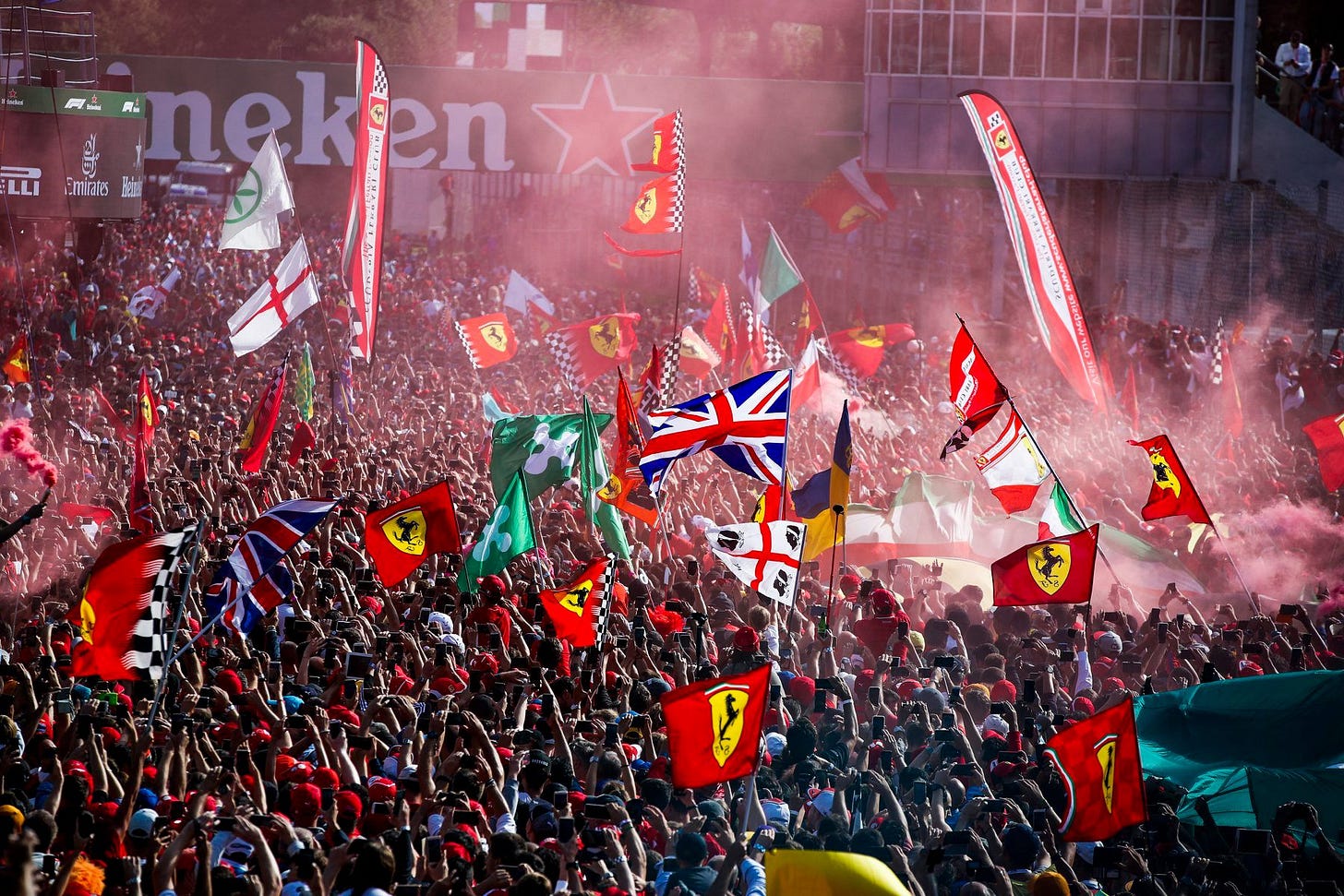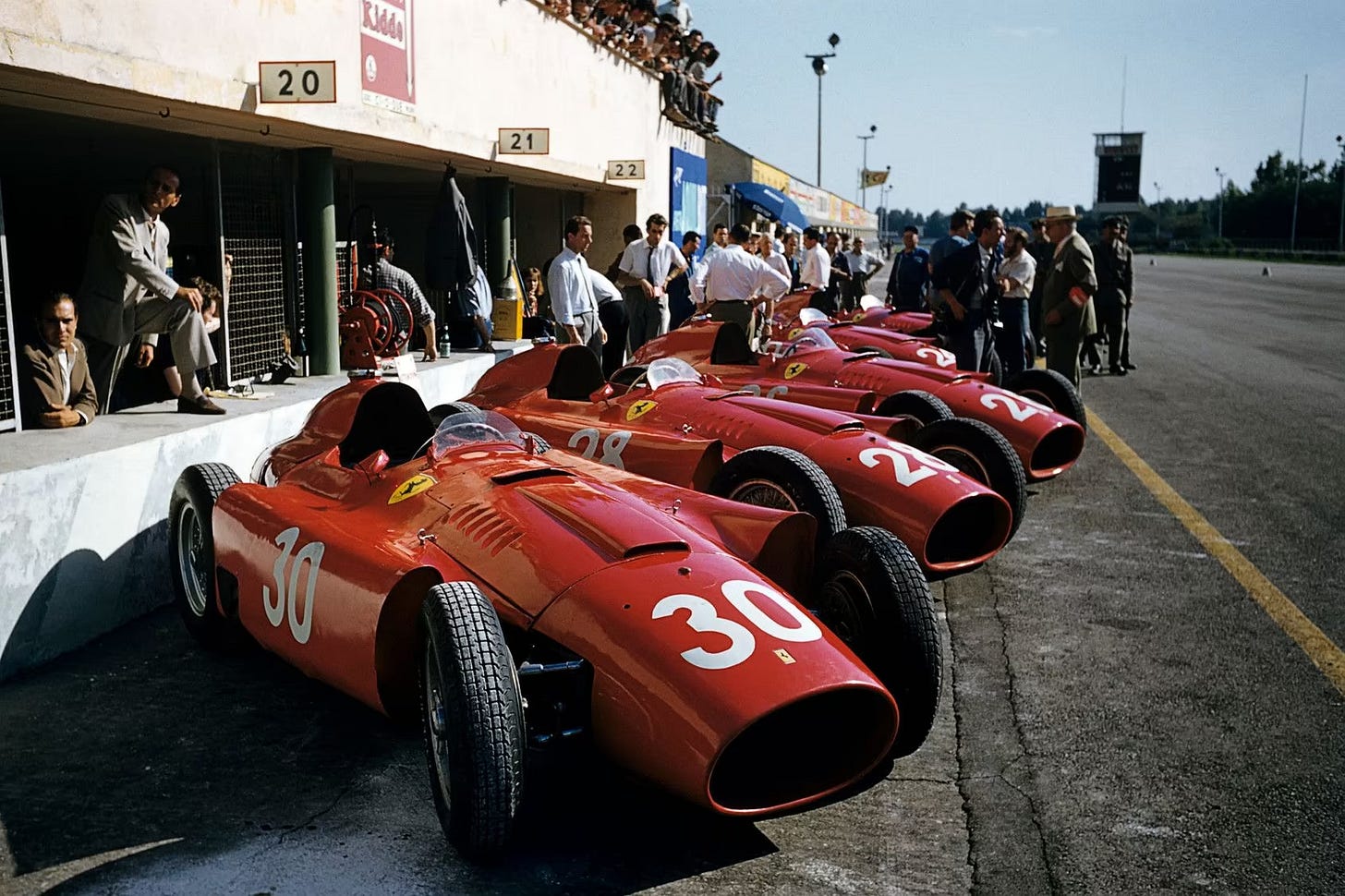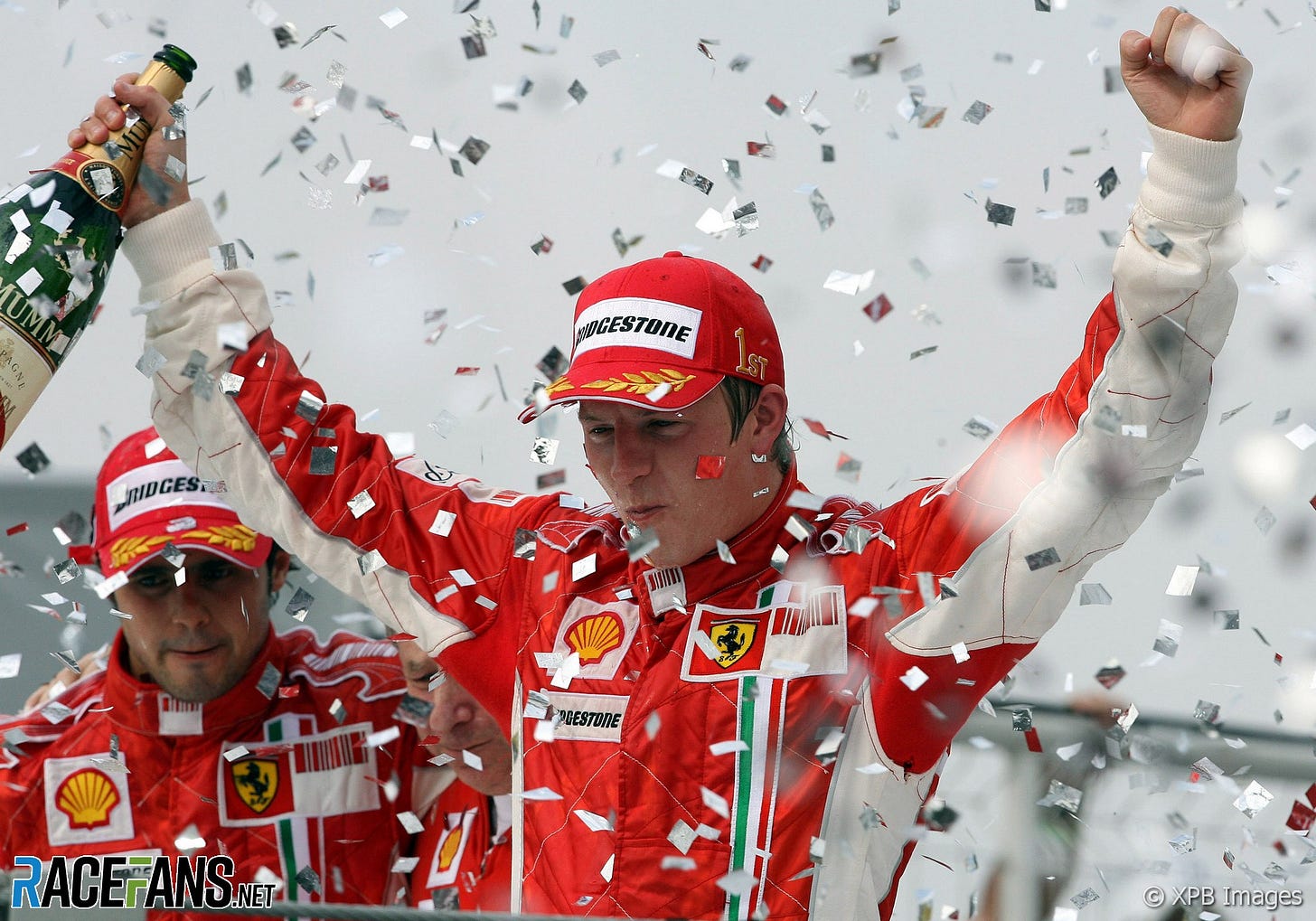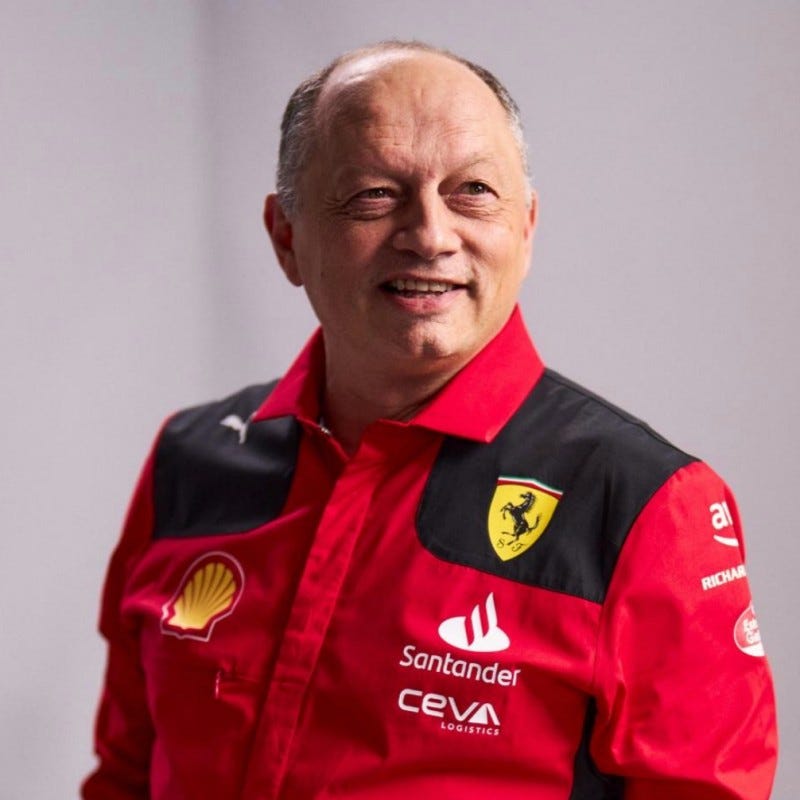Sixteen constructors championships, fifteen drivers championships, 243 wins, 794 podiums—these are the figures that form the impressive CV of Scuderia Ferrari, the most successful team in Formula 1 history. One might even go as far as to suggest that every F1 team boss on the grid would be willing to trade their firstborn for such astounding statistics. Since joining the F1 World Championship in 1950, no other team has quite managed to instill a similar sense of fervor, passion, or loyalty as Ferrari, apparent in the undying enthusiasm of the Tifosi, the ardent fans of the Scuderia.

The team's cars are iconic, always elegantly adorned in their celebrated rosso corsa livery—a Ferrari red that's become synonymous with the team. The list of drivers who have won championships for the Scuderia is a pantheon of greats: Alberto Ascari ('52, '53), the legendary Argentinian, Juan Manuel Fangio ('56), Mike Hawthorn ('58), Phil Hill ('61), John Surtees ('64), Niki Lauda ('75, '77), Jody Scheckter ('79), the indomitable Michael Schumacher ('00-'04), and the recently retired, beloved, and highly respected, Kimi Raikkonen ('07).

From the outside, the allure is undeniable. So why isn't everyone a devout Ferrari fan? The simple answer lies in the fact that there are other enduring traditions at Maranello, aside from winning: like losing, underachievement, chaos, politics, affluence, indecision, privilege, and a near-magical ability to transmute hope into mediocrity. Ferrari, in a word, can be frustrating.
Their dedicated fans find themselves perpetually caught in the crossfire of a splendid winning history and a confounding inability to get their act together. Formula 1 is filled to the rafters with frustrations of all kinds, but there is one frustration that rules them all: Nobody knows the sheer heart-breaking agony of the long-suffering Ferrari fan. The Tifosi are bedraggled, and yet forever undaunted. As if cheering for Ferrari weren’t so much a choice, but a responsibility bestowed upon one at birth, come what may. Choosing to throw your support behind Ferrari is a decision that could sign you up for years of unyielding torment and disappointment. Be forewarned.
So, what exactly makes Ferrari so frustrating, and why is that different from any other F1 team? As with most challenges in F1, it's not a singular issue, but an amalgamation of factors, many of which are unique to Ferrari.
Money is a good starting point. As we've previously discussed, F1 isn't a sport known for its level playing field. For a large part of F1 history, money equated to lap-time, directly buying performance. As the sport's technical complexity increased, having ample funds allowed wealthier teams to explore multiple development directions simultaneously. This is a luxury smaller teams with constrained budgets cannot afford. Ferrari, with its luxury car business profits, has always belonged to the well-heeled end of the spectrum. However, what many F1 fans, including yours truly, find particularly galling is the historical bonus—an extra $35 million annually for Ferrari (it’s been larger in the past), attributed to their “…long-standing presence in the sport and track record as the most successful team.” This hefty annual bonus, in addition to the millions earned from their standing in the Constructors Championship (which amounted to $207 million last year, including $68 million in historical bonuses), feels unjust, especially when compared to the “meager” $72 million that a team like Alpha Tauri, the smaller Red Bull sister team, received in 2022. And what has Ferrari done with all this cash in a sport where money makes a substantial difference? They've secured 40 wins since 2008; their last Drivers Championship was with Kimi Raikkonen in 2007, accomplished in the direct afterglow of the Schumacher era. That's 40 wins and not a single championship of any kind in 15 years, including the present year. Because, let's face it, even the most optimistic Tifosi would struggle to wager on 2023 being Ferrari's year.

The very concept of the historical bonus is unsavory, to say the least. Consider a future where McLaren or Mercedes—the second and third most successful F1 teams, respectively—overtake Ferrari. Would they inherit this historical bonus for being the new most successful F1 team? It's hard to imagine Ferrari sitting back and allowing that to happen.
So, Ferrari enjoys not only a yearly injection of cash, above and beyond their constructors' winnings, but they are also consistently failing to convert this monetary advantage into tangible success. But wait, things can still get worse. The historical bonus is just the tip of the iceberg in the saga of Ferrari's chronic underachievement.
Throughout the years, countless theories have been proposed by commentators and journalists attempting to solve the Rubik’s cube that is Ferrari's continual failure to deliver results commiserate with their financial and technical resources. Each season, particularly during their less successful ones, sees a slew of think pieces endeavoring to dissect Ferrari's maladies. While these pieces vary in their diagnoses, a recurring theme emerges—the management culture at Ferrari, which seems to take a perverse pleasure in pointing fingers and swinging the executioner's axe. Modern management theory be damned, Ferrari remains stubbornly resistant to change. Since they started in F1 in 1950, they've cycled through 23 Team Principals, who, if you glance at the chart below, average a tenure of 2.9 years before being shown the exit.

This figure is somewhat misleading, however, as longer terms by the likes of Marco Piccinini (78’-88’) and Jean Todt (93’-07’) skew the average. The latter, Jean Todt, is particularly noteworthy as the architect of Ferrari's era of dominance during the early 2000s, with Michael Schumacher at the wheel and Ross Brawn designing the cars. The most recent off-season once again bore witness to a managerial purge in Maranello, with Team Principal Mattia Binotto and several members of his technical team being ousted. The seasoned F1 hand Frederic Vasseur was lured away from Ferrari customer team Alfa Romeo Sauber (soon to be Audi). One can imagine his tenure at Ferrari is going to be a short one as well, considering how the 2023 season is shaping up for the Scuderia.

Vasseur’s story is a perfect microcosm of this big Ferrari personnel problem. All the design and planning for the 2023 car was done in the first half of the 2022 season while Fred Vasseur was still at Alfa Romeo Sauber. Fred shows up to Maranello, dons his new team kit, introduces himself to everyone, and then embarks on a campaign where he has had little to no technical input into the design of the car. The car, designed and built by people who are all on gardening leave and passing their CV’s around the grid, underperforms. Fred will then be fired after a year or two, and a new Team Principal will be appointed. That new person will show up and be forced to race with the car Fred Vasseur and his technical team have developed. They will underperform, and the cycle starts again. In this way, Ferrari is like an immortal trapped in a coffin at the bottom of the ocean. They keep waking into the nightmare of their own death, over and over again.
While these structural problems continue to plague Ferrari, the leadership at Maranello is often occupied answering for their on-track decision-making incompetence. It's another layer to the Ferrari saga that exacerbates the issues already discussed. As a fan, or even as a commentator, it seems as though Ferrari could mount a serious championship challenge if they could just tidy up their race weekends. For instance, their performance at the recent Miami Grand Prix, where they finished P5 and P7 (with Carlos ahead of Charles), is a testament to this. A series of crashes (Leclerc crashing once in FP2 and then again in Qualifying) and missteps that could have befallen any team, unfortunately, but somehow predictably, fell on Ferrari.
The 2022 Monaco Grand Prix, where Ferrari squandered a pole position, is a perfect illustration of their knack for seizing defeat from the jaws of victory. Similarly, Leclerc and Vettel's collision while squabbling over 4th place at the 2019 Brazilian Grand Prix, Leclerc's crash while leading the French GP, and, to approach this from another angle, Carlos Sainz's first F1 victory at the 2022 British GP due to his disregard of instructions from the Ferrari pit wall, further underscore this narrative.
Sebastian Vettel's story offers another poignant perspective. After a legendary run that saw him win 4 Drivers Championships in 4 years, Vettel had a dismal run in 2014, losing out to his teammate, the effervescent Daniel Ricciardo. At the end of that season, Seb made the move to Ferrari. This is another great historic trend in F1. A big-time World Champion driver, makes a move to Ferrari so together they can get just one, last, taste of glory. The headlines come thick and fast with all the reasons this time will be different. Why, Seb, in this case, was going to bring championship glory back to Maranello. It never happened. Vettel spent five years with Ferrari, and most of them were pretty forgettable. In 2015 and 2016, Vettel and Ferrari went about the hard work of bringing their car closer to title-contending form. In 2015 he won 3 races and finished 3rd in the Championship behind the two -dominant at the time - Mercedes. In 2016 zero wins and 7 podiums, and 4th in the Championship. Things were not looking good. 2017 and 2018 were much more competitive seasons. However, in both years, Ferrari and Vettel’s title challenges to Mercedes faded over the course of the season.
I remember witnessing the end of Sebastian Vettel’s career in 2018. Hockenheim, Germany, a sunny July day. Seb is on pole for Ferrari. Lewis Hamilton, Seb’s rival for the championship, driving the faster car, is lining up in a lowly 14th. Seb and Valtteri Bottas in the sister Mercedes - both rocket off into the distance at the start. On lap 44 of 67, Seb in the lead - 3 seconds ahead of teammate Kimi Raikkonen who is another 4 seconds ahead of Bottas. Hamilton has just pitted, and the rain starts to fall…on lap 52, the TV smash cuts to David Croft, the voice of F1 races, screaming, “He’s out of the race! Sebastian Vettel! He has been leading, almost from start to finish.” the scene is unforgettable. The camera shows Vettel in a gravel trap; you can’t even see the track in the frame. A cloud of dust trailing off, and an animated Vettel in the car pounding the steering wheel. That was it. He lost the Drivers Championship that year by 88 points, more than two race wins. The replay showed that it was a simple lock-up on a wet section of track. It was the most expensive unforced error I’ve ever seen. Seb was never the same after that crash. He finished that season and then one more with Ferrari in 2019/2020. By then, with Charles Leclerc, Ferrari’s future, already very comfortable in the second car, all parties had to admit that the dream was dead. Seb finished the 2020 season a hopeless 13th in the driver’s standings, with Ferrari finishing sixth in the constructor’s championship. Seb moved to Aston Martin and drove for them for two unremarkable seasons. Ferrari is not just breaking the hearts of the Tifosi year in and year out.
Seb’s story with Ferrari is very similar in its shape to two-time World Champion Fernando Alonso’s time with Ferrari; he raced for them from 2010 to 2014 - no championships. Which echoed four-time World Champion Alain Prost’s failed run with Ferrari. He raced for them in 1990 and 1991 before being sacked before the final race of the 91’ season. Ferrari also breaks the hearts of the drivers who believe in them.
If there were a cure-all for Ferrari's woes, I'd gladly prescribe it. But as Mercedes' Toto Wolff has been saying recently as he and his Mercedes squad fight their own battle to return to glory, "There are no silver bullets in F1." To break free from this cycle of underachievement, something drastic will need to change within Ferrari's senior management. This is no small task as making drastic changes for the good is something Ferrari has shown that are utterly incapable of doing. Wealth and entrenched management have a tendency to become rigid and myopic; they are seldom the instigators of their own revolutions. However, if Ferrari ever hopes to secure a championship victory again, they must either make significant changes or build a car so fast that it outpaces their own incompetence.




